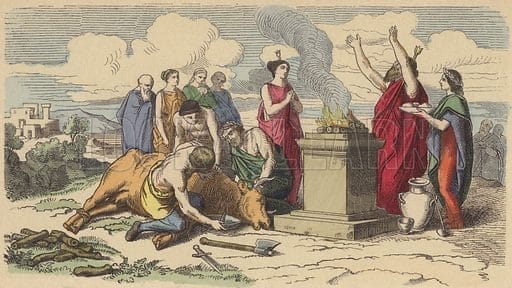Micro Mondays #1: “Pharmakos” by Ian Patterson

“A seed is a promise, or a wish. Like the hanging potential of a guillotine, its success bisects possible futures. Life, or death. Cast off from its mother, dehusked, it carries all the potentials of new worlds, new bloom, but if thrown in infertile soil, if given the wrong conditions, it will wither and rot. Or worse, remain dormant for an eternity. Like your promises then, direct them carefully.” -Quote from The Most Revered Thomas Mills, first Arch-Bishop Prime and father to us all. Made to his congregation, on the launch of Sunflower I.
The Sunflower III launched into the void of space on a Monday. The time was mid-morning, but this was inconsequential. A trivial detail that only factored slightly in the orbital trajectories, those celestial mechanics that once fascinated philosophers for centuries, and now were doldrums left to the compu-cores to calculate. They did so incessantly, and with little difficulty. The early departure also meant most of the passengers, those saints who carried the hopes of a civilization with them, were still in a drug-addled state from the night prior.
Some many thousands of years before that Monday, on the southern tip of a peninsula called Greece, a man was stoned to death. His body was burned, and the ashes spread into the sea. The people sang as they did it, calling out in hymns and prayer, as one does with holy work.
The man’s death would bring them prosperity. A sacrifice to cure the plague, the famine, the drought. A sacrifice for the greater good. The night before he was celebrated with a feast and a river of wine. The people loved him, and even as they killed him, they thanked him for saving them all. This was the Pharmakos.
When the sun started to die the first time, humanity found the real power that a life had. Something hidden, when the world was wrapped in the fullness of its luminous gaze, was made visible. They witnessed it first in the flora. In that instant someone died, there was a flash of light, a spark, and nearby flowers would bloom. It revived even the most stubborn, or those that had slid irretrievably towards death. That sudden flare from a soul exiting this plane would birth new growth that would rise up, and cover whatever was near.
In the days that followed, hospitals were swarmed in ornamental petals, their colors obscuring emergency room floors. Nursing homes were consumed by tendrils of kudzu. Car crashes, those threshers of life and steel, caused a forest to bloom through the cracked pavement. Industrial accidents saw buildings swallowed by nature in an instant. War zones were replaced by trees too thick to navigate.
The priests were the first to understand the divine weight of this. The first to see the message wrapped inside the majesty. Given enough sacrifice, it might revitalize a dying sun. God has always so loved sacrifice. Thousands of years may have passed from the Pharmakos, but a circular trajectory never finds a foreign point.
As the boom of thrusters filled the air, the people stopped talking, their gazes lifting upwards. They were solemn, and grateful. They were thankful for another chance at happiness, for more time with their families, for their own story to continue. Mostly, they were thankful it wasn’t them on that ship.
Into the aching silence that followed, a priest called, “Go now, brothers and sisters, mothers and fathers, sons and daughters. Be our seed from which the sun is sown. Grow for us a flower, mighty and strong, to shine on us so that we too may grow. Go with speed. Go with purpose. Go with our love in your hearts. Be the Sunflower.”
Ian Patterson is many things. Importantly here, he’s the author of Transference and Transcendence (forthcoming). He’s also an engineer, cyclist, foodie, coffee lover, cat dad, human father, and reader of books. Preferably, thick books that deal with strange things and big ideas. He’s dreamed of being an author for decades, but finally began the journey with the birth of his first daughter. This is an objectively terrible time to start work that requires quiet concentration, and he knows it, but he loves the chaos nonetheless.